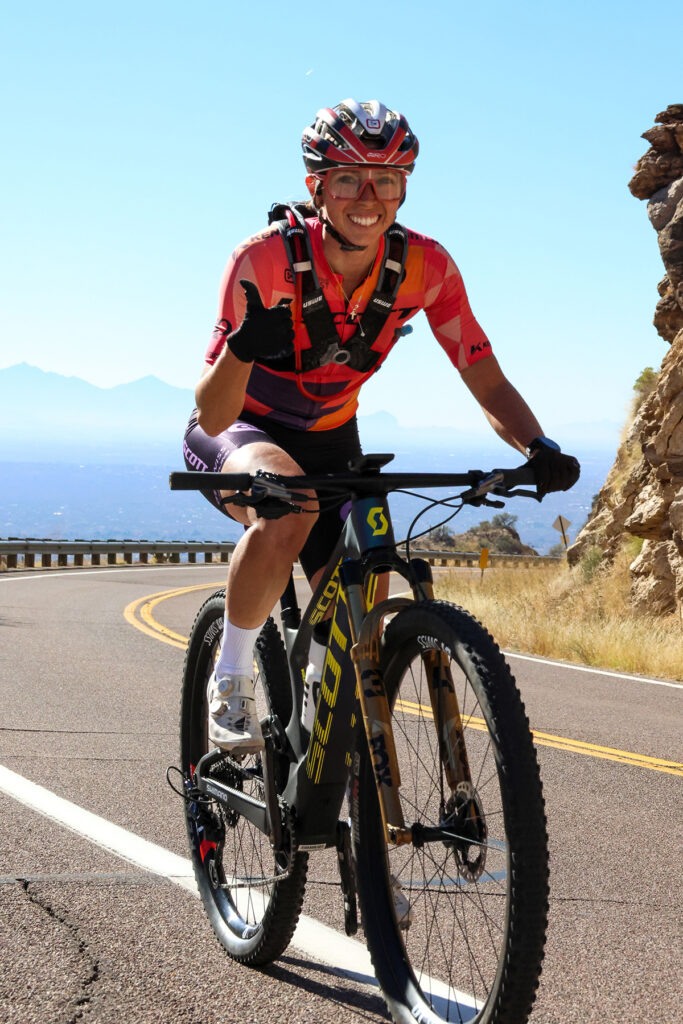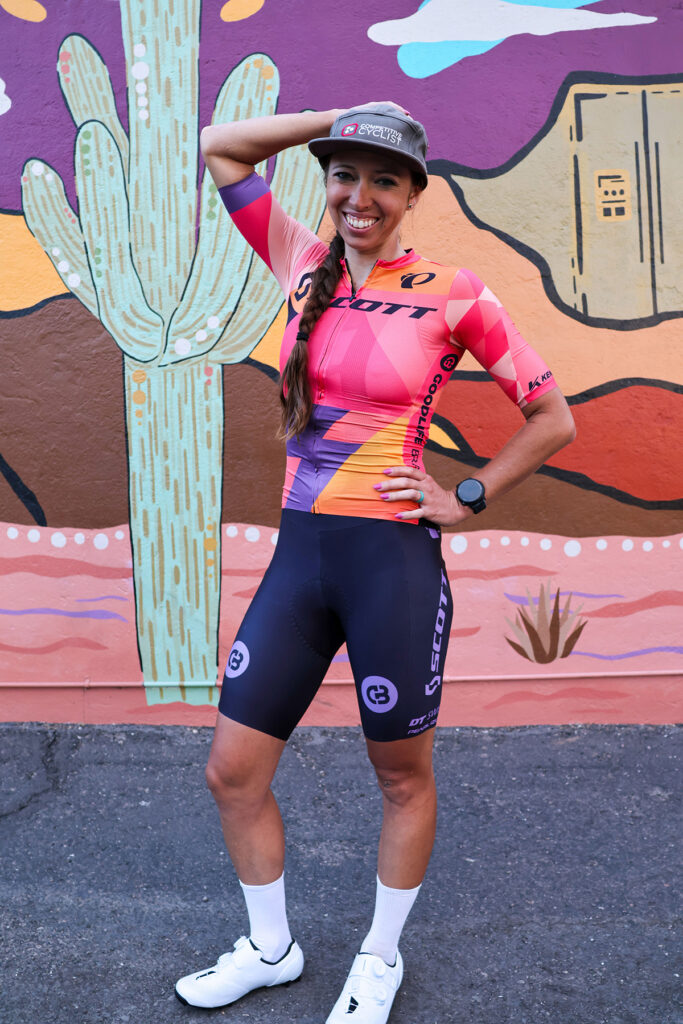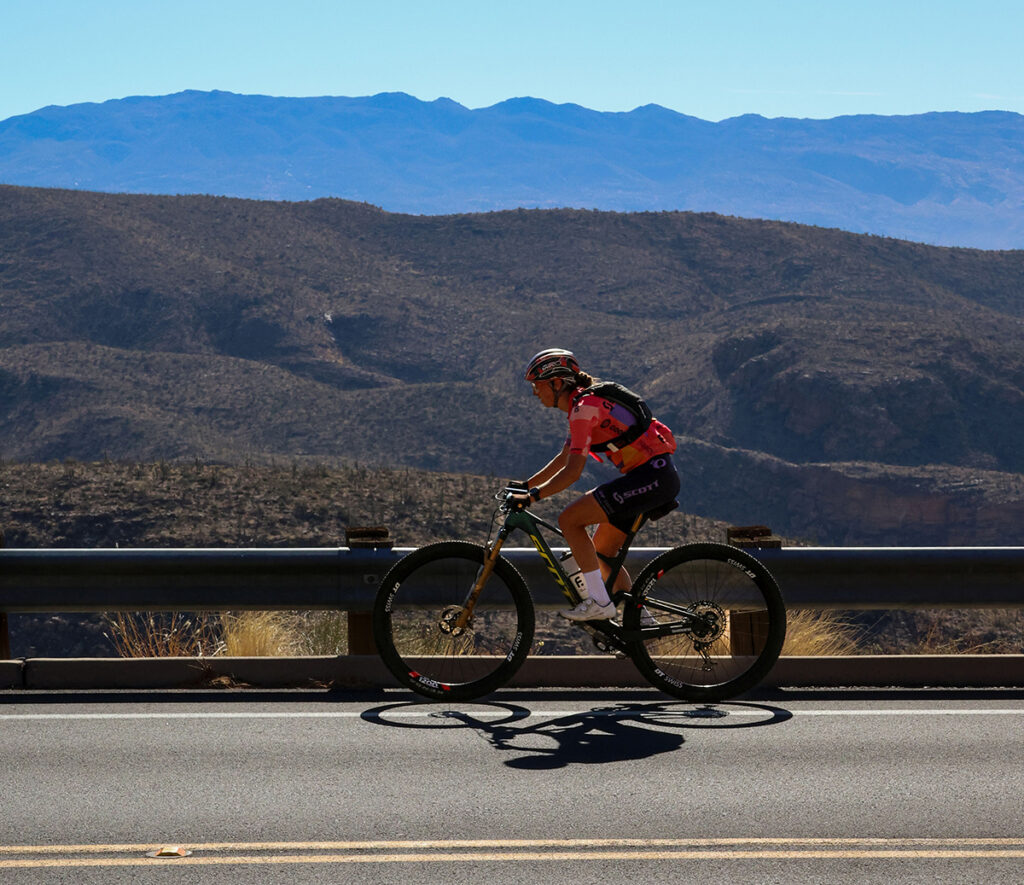By Bradley Bleck
Cover photo courtesy of Hannah Otto
If ever there was an athlete’s journey to follow, consider Hannah Otto, whose roots in the Inland Northwest go back to her great-grandparents. The professional mountain biker has an impressive palmarès, including stints with USA Cycling, collegiate championships, winning the 2023 Leadville Trail 100, and finishing two seconds behind the Unbound Gravel winner in 2024, all while advocating for women and youth in the sport.
I spoke with Otto about her career, Spokane, and professional mountain biking. What follows is a condensed version of our chat.
OutThere: How did you become a professional mountain biker?
Otto: From age nine to 20, I raced triathlons. While I was in college, the Clif pro team had recruited me. They discontinued their triathlon program, but said I could continue as a mountain biker. So in the middle of college, I went all in. During those early years, it was about improving. Being constantly focused on improvement was the single most motivating thing. By the time I finally picked my head up, I had made it onto the podium.

OutThere: What are you most proud of, on or off the bike?
Otto: Winning Leadville because of how I got there. The week before, I crashed and separated my shoulder. I spent pretty much the whole week at doctors’ appointments. Wednesday before the race I said “Can I race?” They said “You’re not gonna make it worse, but it’s gonna hurt.” I lined up free of expectations and raced for fun. At mile-70 I took the lead and won by five minutes. I was able to rid myself of the pressures of expectations and just do what I know how to do.
OutThere: Is there a disappointing experience that taught you a great lesson?
Otto: Even though I don’t consider it disappointing at this point, it is when I pursued the fastest known time (FKT) on the Kokopeli Trail, a 142-mile trail from Moab, Utah to Loma, Colorado with 16,000 feet of climbing. The first time I did it, when I crossed the top of the mountain, the temperature dropped from 30 degrees to about 7 degrees with several inches of snow. I had hypothermia and was somewhat delirious. After 13-1/2 hours, I missed the record by 15 minutes. I was devastated because I put so much out there and came up short. Six months later, I beat the record by over an hour. That first time was so miserable and took me so far past my perceived limits that I learned what new limits I had.

OutThere: What advice would you give to someone wanting to achieve success as an athlete, women in particular?
Otto: Avoid comparison. Comparison can expose your shortcomings rather than celebrating what you’re great at. What I’ve seen in the women I look up to and the athletes that have been the most successful, they celebrate everyone’s success and never feel threatened by someone else being successful. Instead they use that as inspiration to fuel their own journey.
OutThere: Can you tell me about your involvement with NICA?
Otto: NICA is the National Interscholastic Cycling Association for high school athletes competing in mountain biking, about 25,000 athletes nationwide. NICA is getting kids in the sport early, giving them friends who love bikes, creating a healthy lifestyle of fun and community. I have a degree in exercise science and athletic training, so I’m offering a four-part webinar through NICA on goal setting, training, and race prep. My goal is if I’ve made the mistake, let me tell you about it so that you don’t have to.
OutThere: What are some of the challenges you face as an athlete?
Otto: A huge storyline throughout our sport comes down to a business standpoint. Do you work for a team, or do you start your own business, be a privateer? Being a privateer can be a lot more legwork. I work with an agent. She and I negotiate each contract with each sponsor. I’m in charge of working with those sponsors and hiring my own photographer, mechanic, whatever I need. I am the one who ultimately needs to organize everything.
OutThere: Can you tell me about your relationship to Spokane?
Otto: My great-grandparents lived in Spokane and my granddad was born in Spokane. My brother, who is involved with Friends of the Bluff, his wife, and their two daughters live there. About 80 years ago my granddad, when he was 20, built a cabin by hand at Priest Lake, which is definitely one of my family’s favorite stories and a huge legacy.
OutThere: Do you have any favorite Spokane rides or hikes?
Otto: One of my favorite things about the bike is it facilitates the ability to explore. Every time I’m in Spokane, I am impressed by all the opportunities for riding. I explore everything from the Bluff to some of the gravel roads.
OutThere: What are your 2025 goals?
Otto: Every season they get bigger. I will be targeting the Lifetime Grand Prix again this year. That’s six mountain bike and gravel races across the U.S. I’ll be pursuing the overall series while highlighting Leadville. Then I plan to represent the USA at the Marathon Mountain Bike World Championship in Switzerland.

OutThere: Any last thoughts to share with OutThere readers?
Otto: I love riding my bike. It is the best way to see the world. The car is too fast. Walking, you can’t cover as many miles. The bike is just the most beautiful way to go places and see things. My bike has taken me all over the world. I’m just incredibly grateful for that opportunity and I want others to have it.
Bradley Bleck continues to love living and recreating in Spokane while also teaching English at SFCC. This winter he’s testing his bionic hip on the slopes in the region, and it’s been amazing.













